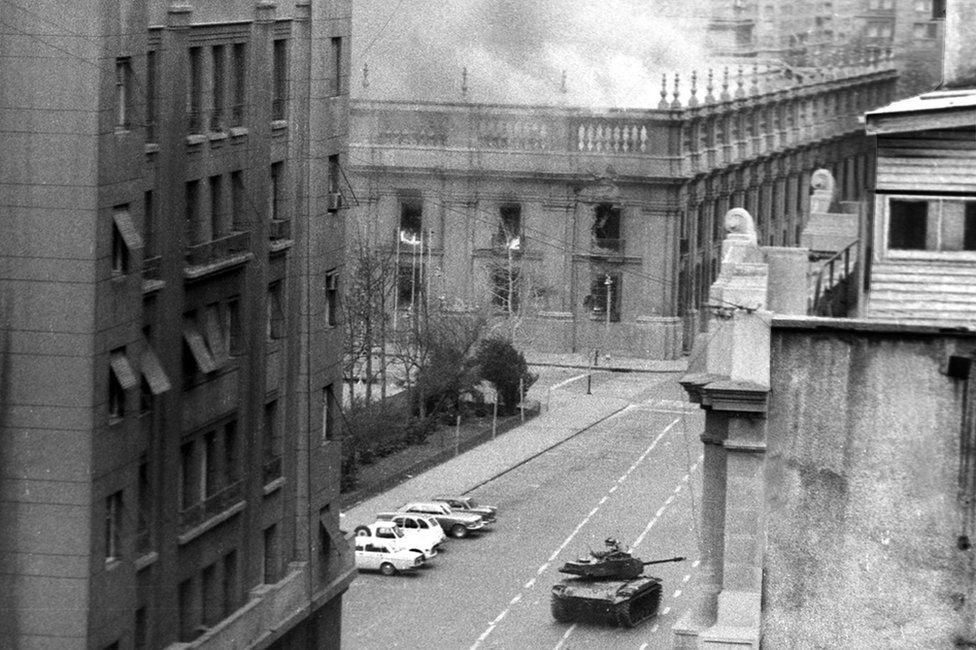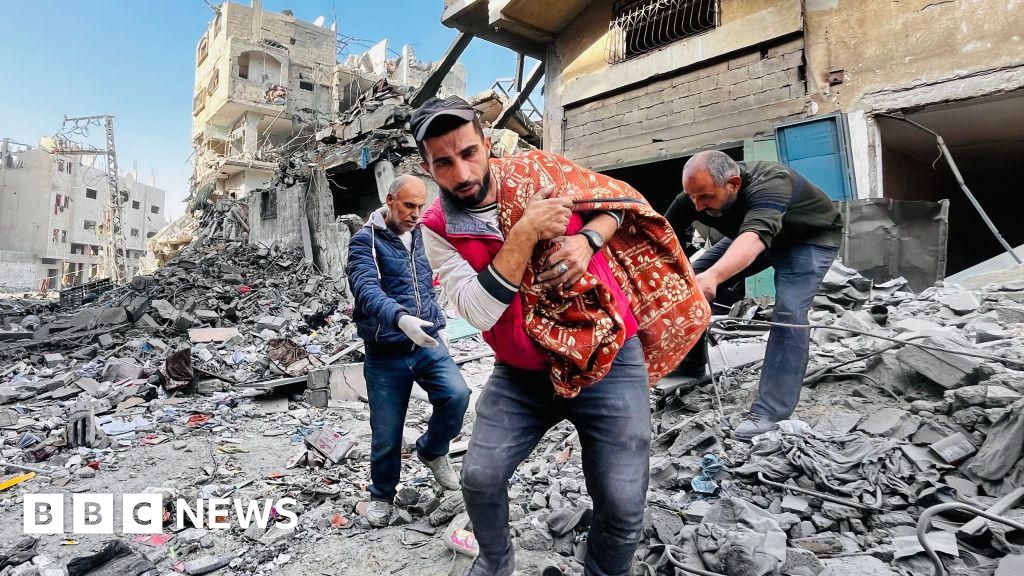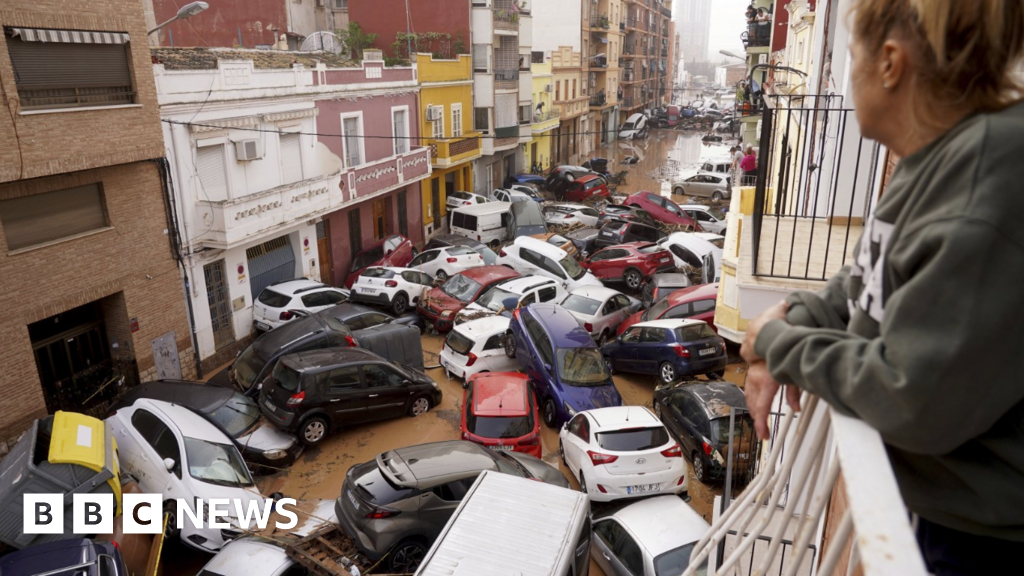ARTICLE AD BOX
 Image source, Getty Images
Image source, Getty Images
La Moneda palace was bombed during the coup on 11 September 1973
By Charis McGowan
Santiago, Chile
Fifty years ago today, Chile's presidential palace, La Moneda, was bombed as part of the military coup to overthrow the country's democratically elected socialist president, Salvador Allende.
By the end of that fateful 11 September 1973, President Allende was dead and a military junta had seized power.
During the 17 years of military rule under General Augusto Pinochet that followed, 40,000 people were detained, tortured or forcibly disappeared. More than 3,200 were executed.
The years of dictatorship continue to haunt and divide Chile.
"These walls… have witnessed horrors, and a violent and oppressive past that we haven't forgotten and won't forget," President Gabriel Boric said from the balcony of La Moneda in March 2022 after he was sworn in as the youngest Chilean president at the age of just 36.
Image source, Getty Images
Image caption,Gabriel Boric referred to the coup in his speech after being sworn in
His young, progressive cabinet promised to confront and address the violations of human rights committed under Gen Pinochet.
In the run-up to today's anniversary, his left-wing government launched the National Search Plan, the first state-backed programme to determine the fate of 1,469 people who disappeared during military rule and who remain missing all these decades later.
They are presumed to have been murdered by the state, but their bodies were never found.
Government spokeswoman Camila Vallejo, who heads Chile's Ministry General Secretariat, says the aim of the plan is to commit to helping the families of the disappeared so that they "do not have to carry the responsibility of finding their loved ones or knowing the truth solely on their shoulders".
The project will have a dedicated budget and staff of investigators. Relatives of the disappeared may be entitled to reparations.
The National Search Plan is not only designed to find those who were forcibly disappeared, but also to establish the circumstances behind their disappearance and bring justice to the families who have spent decades desperate to know the truth.
Image source, Getty Images
Image caption,Photos of the disappeared were projected onto La Moneda on the International Day of the Disappeared
Even though democracy was restored in 1990, Gen Pinochet's shadow continues to loom over Chile.
Pinochet remained head of the army until 1998 and after that continued to serve as senator-for-life, a post he created for himself in the constitution he had imposed in 1980. As a senator he was immune from prosecution in Chile.
But in 1998, during a visit to London, he was put under house arrest while Spanish lawyers tried to get him extradited to face trial there on torture charges.
In 2000, Britain's home secretary at the time, Jack Straw, allowed Gen Pinochet to return to Chile on health grounds.
Image source, Getty Images
Image caption,When Augusto Pinochet (left) arrived in Chile, he dispensed with the wheelchair he had been using
The general died in 2006 aged 91 without having spent a day in prison.
Chile's present-day government, many of whose members forged their political careers rallying against the legacy of Gen Pinochet's conservative neoliberal regime, says it is committed to bringing perpetrators of crimes committed under military rule to justice.
The Supreme Court told the BBC that Chile's judiciary was currently processing more than 2,000 cases of human rights violations allegedly committed by state agents during military rule.
However, many victims and their families say the process has been slow and ineffectual.
Many former army officials have died in old age without ever facing trial. Others were sent to comfortable prison facilities equipped with private rooms, tennis courts and BBQ areas.
Image source, Getty Images
Image caption,President Gabriel Boric joined relatives of the disappeared in a commemorative march on the eve of the anniversary
Minister Vallejo acknowledges that the progress which has been made so far has been achieved "thanks to the fight of human rights organisations and victims' families" rather than the state.
She says she understands the distrust that victims' families harbour toward Chile's institutions, some of which have mishandled investigations.
Earlier this year, it came to light that 89 boxes containing evidence from the dictatorship era - including bone fragments - had lain abandoned in a university basement for two decades where they were damaged by mould and damp.
Camila Vallejo told the BBC that police forces, the forensic service and courts would be involved in the National Search Plan.
She added that it would become "permanent state policy" so that it would continue even if there was a change of government
Image source, Val Palavecino
Image caption,Camila Vallejo says victims' families have been at the forefront of the fight for justice
She added that the families of the disappeared would not just "accompany" the process but also "monitor" it.
In the run-up to the anniversary, President Boric met all the living former presidents of Chile to sign a formal declaration condemning the dictatorship of Gen Pinochet.
Among those who signed was conservative ex-leader Sebastian Piñera, who had opposed the UK arrest of Augusto Pinochet, and whose brother had served as a minister under the general.
But despite the endorsement by Mr Piñera, the document has come in for criticism from some on Chile's right, many of whom still defend the late dictator.
Members of Mr Piñera's National Renewal party have expressed their discontent with the former president's support for the declaration.
Speaking on local radio, Senator Manuel José Ossandón accused the Boric administration of stoking "polarisation" in the country.
The senator said that "there would have been no Pinochet if there had been no Allende", blaming the overthrown leader and his socialist politics for his own overthrow and the military rule which followed.
Minister Vallejo said such comments were "unacceptable", adding: "You can't put the victim on par with the perpetrator."
Image source, Val Palavecino
Image caption,Camila Vallejo has condemned comments which equate Allende and Pinochet
"It's part of democracy to have different views of Allende," she argued. "But you can't lay the responsibility of the coup on Allende when it was Augusto Pinochet who carried it out."
For her, the declaration marks a "historic event" which demonstrates to Chileans, and the world, that "democracy and human rights must always be defended, independent of our differences".

 1 year ago
18
1 year ago
18








 English (US)
English (US)